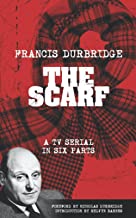In a guest post on this blog last month, Melvyn Barnes explained the work he'd been doing with the estate of Francis Durbridge and that enterprising small press Williams and Whiting to bring to print a good many of Durbridge's stories for TV and radio. I'm a Durbridge fan and I think this is a very worthwhile project indeed.
I was especially interested to read La Boutique, a radio serial in five parts which hadn't previously registered on my radar. The book contains the original scripts, which were especially commissioned by the European Broadcasting Union. As Melvyn points out in his intro, the story was written in 1967 and Durbridge was the first author to be invited by the EBU to write a radio serial for multi-lingual broadcasting. It shows how popular he was across the continent at that time.
La Boutique is a classic Durbridge mystery, with many of the tropes we know and love in evidence. The starting point is a meeting between Robert Bristol, a cop, and his songwriter brother Lewis. Lewis tells (with the aid of flashback scenes) the story of how he became infatuated with Virginia, whom he met in the US - only for her to disappear in highly mysterious circumstances. There's also a puzzle about a missing belt from a dress shop, La Boutique, owned by Lewis's ex-wife Eve. The plot thickens when a corpse is found - with the missing belt . A classic Durbridge cliffhanger to end episode one. I very much enjoyed this story.
The Scarf was a TV serial which was hugely popular back in 1959: it was shown on BBC TV in six thirty-minute episodes, with Donald Pleasence playing Inspector Yates and a cast which boasted the likes of Patrick Troughton and Anthony Valentine. A young woman called Fay Collins is found strangled on a farm tractor trailer and suspicion falls on a publisher called Clifton Morris. It's another story in the vintage Durbridge mould - the eponymous scarf adds to the puzzle, rather like the belt and a photograph of the shop in La Boutique, like the doll in The Doll, and so on...TV scripts aren't as easy to read as radio scripts in my opinion, because of the visual component, but this is an interesting story that is sure to entertain Durbridge fans.

2 comments:
After reading this post this morning, my mind has had criss-crossing thoughts that bring to ask you a question. When I read the line, "the story of how he became infatuated with Virginia, whom he met in the US - only for her to disappear in highly mysterious circumstances," I thought about the film Vertigo, of course. But I was also reminded of one of my favorite novels by Robert Goddard: Caught in the Light. I then wondered if you had read and reviewed this book, so I googled your name + Robert Goddard… and discovered that you and Mr. Goddard will be, along with Ann Cleeves and Andrew Child, "among authors featuring at CrimeFest, one of Europe’s biggest crime fiction conventions, this spring.” This is exciting news, and I look forward to reading on your website about the event coming in May, and your experience there.
In addition, I discovered a write-up from February 2019, announcing “Robert Goddard honored with the CWA Diamond Dagger” award, in which you, as CWA President, were quoted giving praise to Robert Goddard.
But my question remains, have you reviewed Caught in the Light, or any other of Goddard’s novels? I don’t read much “golden age” fiction, but Goddard’s writing feels to me like it might approach some of the aspects of that time period? For example, his writing in Take No Farewell, or Found Wanting, or even Sight Unseen? I’m just wondering what some of your thoughts might be on Robert Goddard’s novels.
Carry on! Kelley in Scottsdale
Thanks, Kelley. I admire Robert's writing and I have a vague memory of reviewing one or two titles for a magazine many years ago. I've only read a portion of his considerable output (including a couple of audio versions) and Caught in the Light doesn't ring a bell. Nor have I read the others you mention. But I'm much looking forward to the conversation with Robert next month.
Post a Comment